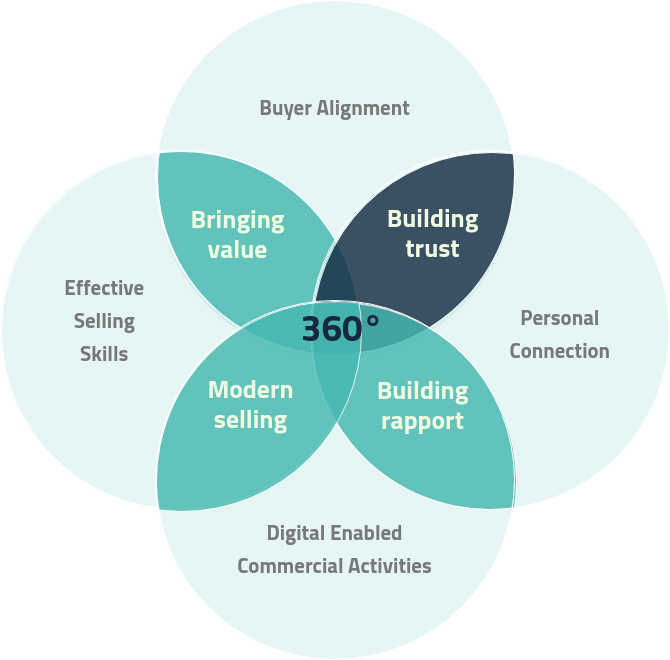Building Trust in Sales: Proven Strategies for Lasting Success
When it comes to sales, the core foundation for success is trust. But why does trust play such a crucial role, and how can it be cultivated and maintained? This comprehensive guide will dive into the importance of trust in sales, provide actionable strategies for building trust with customers, and explore advanced techniques for rebuilding trust when things go awry.
Building Trust in Sales is vital as it forms the cornerstone of long-term relationships and customer loyalty, which are key to sustainable and profitable sales growth.

Source: Perpetos
Understanding Why Trust Matters
The Importance of Trust in Sales
Trust is not just an abstract concept; it is a tangible asset in sales. When customers trust a salesperson, they are more likely to engage, share their needs, and ultimately make a purchase. This extends beyond the initial sale and lays the groundwork for a lasting relationship, increasing the probability of future business and referrals.
Impact on Long-term Customer Relationships
The long-term impact of trust is profound. According to Dale Carnegie, “81% of respondents indicated that they would likely buy again from a company represented by a salesperson they trust.” This statistic underscores how trust leads to repeat business and customer loyalty, becoming a critical driver of sustainable sales growth.
Negative Effects of Low Trust on Sales
Conversely, low trust can be detrimental. Customers who do not trust their salesperson often withhold crucial information, making it difficult to identify and meet their needs, consequently diminishing sales opportunities. This can lead to a cycle of negative experiences and lost customers.
Building Trust from the Ground Up
Preparing with the Customer in Mind
Tailoring your approach to each customer’s unique needs and concerns is essential. By demonstrating that you understand their specific situation, you can build rapport and show that you are genuinely interested in helping them.
Asking Great Questions
One effective way to build trust is by asking open-ended questions. This allows customers to express their needs and concerns, providing you with valuable insights to tailor your solutions. It also shows that you are listening and value their input.
Creating Value Proactively
To build trust, proactively provide value to your customers. Share insights, useful information, and practical solutions that address their needs. By doing so, you position yourself as a valuable resource and not just a salesperson.
Honesty and Transparency
Honesty is the best policy when it comes to building trust. According to MEDDICC, “Being transparent with your customers will create a culture that fosters open and honest communication.” Always be upfront about what you can and can’t do. Transparency in your communications fosters a culture of trust and strengthens customer relationships.
Practical Strategies for Trust Building
Establishing Credibility
To gain trust, you must first establish your credibility. Share evidence of past successes, such as testimonials and case studies. According to Yesware, “Establishing credibility is vital to gaining comfortability. Once your prospect is comfortable with you, trust can be built.” When prospects see that others have successfully worked with you, they are more likely to trust your capabilities.
Demonstrating Genuine Concern
Showing empathy is crucial. Understand and address customer pain points sincerely. By doing so, you show that you care about their issues and are committed to helping them, which builds emotional trust.
Utilizing Social Proof
Social proof, such as testimonials, reviews, and case studies, can significantly bolster your claims and boost conversions. Customers tend to trust the opinions of others, especially those who have faced similar challenges. Highlighting positive feedback can help establish trust more quickly.
Consistency in Communication
Maintaining regular and consistent communication is key. Follow up on promises and ensure that your customer interactions are consistent in message and tone. This reliability helps build a predictable and trustworthy relationship.
Advanced Techniques for Rebuilding Trust
Empathy and Understanding
In cases where trust has been eroded, expressing empathy is vital. Active listening and validation of the customer’s feelings can significantly help in rebuilding trust. As noted by Richardson, “Expressing empathy will help you to coax out and reduce negative emotions.” Addressing concerns with understanding can mend broken relationships.
Addressing and Learning from Past Mistakes
Mistakes happen. When they do, handle them proactively. Acknowledging errors, apologizing, and taking steps to rectify the situation can turn a negative experience into an opportunity to demonstrate your commitment to better service.
Feedback and Continuous Improvement
Gathering feedback from customers is crucial for continual improvement. Actively seek their input and make evident changes based on their suggestions. This not only improves service but also shows customers that their opinions are valued and acted upon.
Leveraging Technology for Trust
Video Communication
Using video calls can build a more personal connection with customers. It adds a face to the name and allows for more dynamic interactions, fostering a sense of closeness and trust.
CRM Tools
Customer Relationship Management (CRM) tools can track customer interactions and history, enabling personalized engagements. Keeping thorough records helps you remember previous conversations and preferences, making customers feel valued and understood.
Conclusion
Building and maintaining trust in sales is an ongoing process that requires consistent effort and a genuine focus on the customer’s needs. By implementing the strategies discussed above, such as asking insightful questions, demonstrating empathy, and leveraging social proof, sales professionals can create lasting relationships with their customers. Moreover, embracing technology for communication and CRM can further enhance these efforts, ensuring that trust remains at the foundation of all interactions.
Trust is a fragile but vital component in sales relationships. By investing time and effort into understanding and meeting customer needs with honesty and transparency, businesses can achieve long-term success. Remember, a trusted relationship is not only beneficial for closing the initial sale but is instrumental in fostering customer loyalty and repeat business, ensuring sustained growth and profitability.
Explore more on related topics like Sales Productivity Hacks and Overcoming Sales Objections to further hone your skills and strategies in sales.


